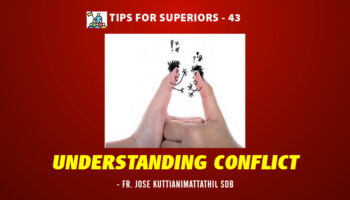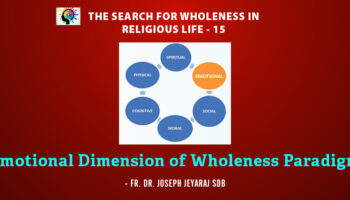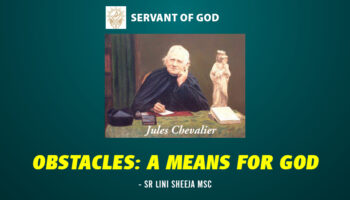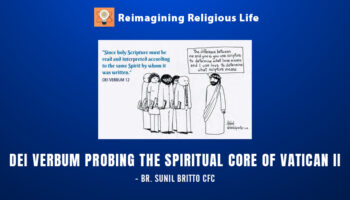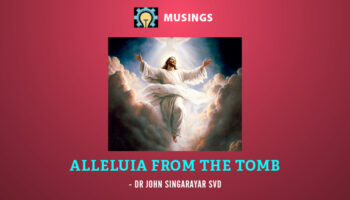A Conversation with Fr. Keith D’Souza S J
Fr Keith D’Souza SJ was Professor of Philosophy and Religious Studies at St Pius College, Mumbai, Maharashtra for over 20 years. Presently he is rector of St Xavier’s College, Mumbai. Keith is a philosopher, writer, leader, visionary and above all one who constantly expands his mind and heart to reach out in love and compassion to the depth of the divine and human mystery within himself and around. This interview with Janina Gomes, our veteran writer and conversationalist, uncovers the nuances in his perspectives to theology, philosophy, and priesthood, a critical process that is much needed in today’s context.
- How and when did you experience the call to become a Jesuit and what attracted you to their Order?
I studied in a Jesuit School (St. Mary’s) and a Jesuit College (St. Xavier’s), both in South Mumbai, and was impressed by the contribution of committed Jesuits and lay collaborators. Both institutions had illustrious alumni who were very grateful for the education imparted by their alma mater. During our rural outreach camps, I was very impressed with the generous and dedicated work put in by the Jesuit Fathers and Cannosian Sisters for marginalized communities. These early influences motivated me to consider joining the Jesuits soon after I graduated.
- You are highly qualified to teach Philosophy, Theology and Ethics, and you taught Philosophy to the seminarians at St. Pius X College in Goregaon, Mumbai for over 20 years. Why do you feel such subjects are important for future priests?
I graduated in B.Sc. (Physics) at St. Xavier’s, Mumbai, but after joining the Jesuits I was deputed to do higher studies in Philosophy at Mumbai University and subsequently at Marquette University, Wisconsin, USA. I also did a Master’s course in Theology at Jnana Deepa in Pune. This exposure to science, philosophy and theology enabled me to develop a holistic outlook to life, and in turn, to share both an analytic and synthetic approach with my students at the many institutions in which I have taught. The formation for Catholic priesthood is unparalleled in terms of its scope and depth for clerical training. Seminarians are expected to develop critical thinking, an educated and mature understanding of scripture and tradition, and a balanced socio-pastoral outlook. Priests are expected to have spiritual depth, be inspiring leaders, efficient managers and lively animators of the communities they serve. All of this requires a comprehensive formation.
- You specialized in hermeneutics (the interpretation of the Bible and other literary texts) at Marquette University in the U.S. How did your doctorate in hermeneutics help you teach young priests in an area which is crucial for them today?
My specialization was in philosophical hermeneutics, which is the theory of interpretation. Every aspect of life—texts, customs, social relations and hierarchies—entails some form of interpretation or the other. Hermeneutics allows for a critical distance from all of our “normal” beliefs and practices, in order to inquire whether these can be improved upon in some way or the other. Theologically, hermeneutics has to do with appropriately “reading the signs of the times”, and responding to them positively and creatively. This demands a fundamental openness to change.
- You are the Rector of St. Xavier’s College, Mumbai, since 2018. What do you feel is really important for an autonomous educational institute to focus on these days?
Autonomy has given us the academic freedom to design and run our curricular, co-curricular and extra-curricular programmes. One hopes that the new National Education Policy will facilitate autonomy and not fall into the trap of standardization of education—which will eventually result in a nationalization of mediocrity. Our three core values at Xavier’s are professional innovation, personal integration and social inclusion. All three are tall orders: critical and creative thinking are not normally encouraged in our school and college campuses; we have a major problem with issues of integrity and transparency; and we live in a very hierarchical and binary oriented society, ridden with multiple types of discrimination. Besides providing high quality formal and professional education, it is important that these complimentary aspects of education are given equal importance in teaching and learning processes.
- You have been a Christian presence in philosophical societies and have been a life member of the Bombay Philosophical Society and its Vice President from 2018-2020. Did your association with this Society and your role as Life Member of the Association of Christian Philosophers of India (ACPI), and its President from 2015-2022 give a sense of direction to these Societies by upholding Christian values?
Critical thinking, which is at the heart of the discipline of philosophy, was employed assiduously by Jesus when he engaged with his interlocutors, and by St. Ignatius of Loyola, when he espoused the art of discernment in decision making. Both Jesus and Ignatius were interested in creating more just and humane communities. I have tried to uphold these values in various philosophical forums. Along with a critical mass of thinkers in the ACPI, we have helped promote a distinctively “socio-critical school” of philosophy. From the Indian as well as Christian perspective, philosophical thinking needs to be consciously placed at the service of a critical understanding of social issues and a constructive resolution of social problems.
- You have widened the scope of your ministry to include the direction of leadership, management and spirituality programmes. Are you embracing contemporary issues and developments so important for priestly formation?
For more than a decade, I used to be on the faculty of “Power to Lead”—a leadership and management programme for lay people in Mumbai. Besides this, I have directed numerous retreats and workshops for clergy, Religious and laity, in India and abroad. I have adopted an integrated “psycho-socio-spiritual” approach in all of these endeavours, based on sound philosophical, theological and sociological presuppositions. The cultivation of such an approach, I believe, is important for priestly formation.
- You have also widened the scope of your activities to the formation of young Jesuits from Bombay Province, since 2014, and by teaching religious studies at St. Pius X college in Goregaon. These have led you to develop a vision for young priests. Could you share your vision with us?
Young priests need to be given the space to creatively discover newer ways of engaging with, and ministering to people. This is especially needed if we are to connect with youth, who may not appreciate traditional ways of belief and practice. Young priests need to tap into the high levels of energy and generosity of many competent and committed laity you will find in any typical parish. If we wish to put new wine into new wineskins, then we will need to encourage seminarians and young priests to use their talents and to work collaboratively with willing lay people, rather than smother their enthusiasm by adopting authoritative and bureaucratic mentalities.
- You have been an editor of many books, and been on the editorial team of the ambitious ACPI Encyclopedia of Philosophy. You are obviously part of the thinking Church in India. Tell us something about the value of archiving information like this for future generations.
India is still largely an oral tradition. We need to develop the art and science of independent thinking and scholarly writing. The ACPI has encouraged young researchers to publish their articles in an annual publication. A revised and enlarged edition of the ACPI Encyclopedia of Philosophy is on the anvil. This archived philosophical contribution is invaluable, as most Western philosophical literature is rather dense and technical, and most Indian philosophical thinking is fused with spiritual and theological thinking. The ACPI has provided a unique corpus of philosophical writing which is understandable (reader friendly), critical and socially relevant.
- You have written more than 50 articles on topics such as the “Mystical and Prophetic Wisdom of South Asia”, “Respecting our Common Home”, “Globalization and its Discontents” and even the “Contribution of Hinduism to Indian Culture”. How important is it to share this information with a larger audience, which may not have been exposed to these ideas before?
It is important for philosophers to enter into public discourse. Unfortunately, very few intellectuals in the Church have been able to contribute to public debate, even though we have a huge number who are able to do so. We also need to write in a manner which is reader friendly, rather than esoteric and accessible to only a few. The clergy need to share their learnings with the faithful and the general public, as an integral part of their ministry.
- Is there anything else you would like to add?
The Church is largely old and insular. We need to speak a new language of love and energy, relevant and understandable to the masses. We also need to get out of the ghettoes in which we largely live. We run successful institutions, but our work is often in silos. We need to engage with those who live beyond our parishes, institutions and organizations. Otherwise, we will continue to be misunderstood, and not sufficiently appreciated for our immense contribution. We will also not be able to make a significant impact in terms of enhancing the common good. We need to enter into ongoing dialogue outside our ghettoes, without sacrificing our identity, in an empathetic and collaborative, yet responsibly assertive manner.
To subscribe to the magazine, click Subscribe

